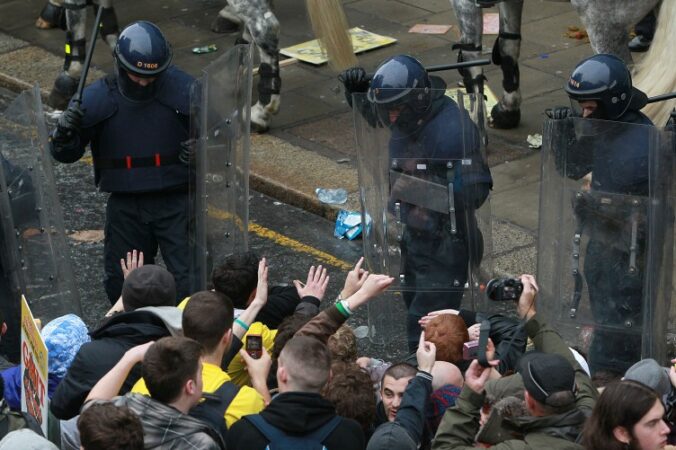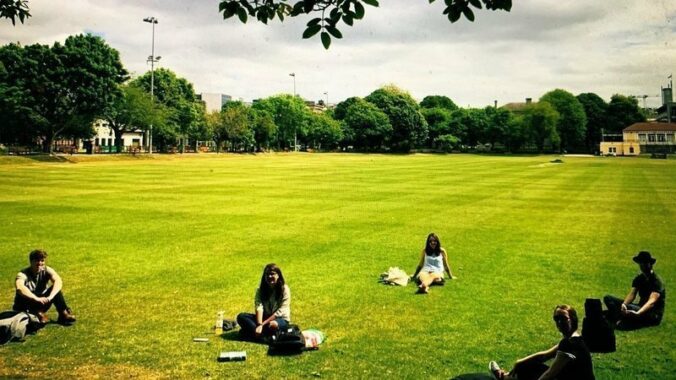Here is a collection of tenders from Etender (Irish Government website) for the consideration of newspapers.
Leftist students for social progress.
Month: November 2021
Students4Change supports USI’s F*ck the Fees Protest.
USI’s protest takes place Molesworth Street in Dublin at 2pm on the 23rd. Other regions have protests too, check out USI’s social media.
Tuition fees for third-level were abolished in the mid-1990s, however, this has resulted in the Government being tempted to slowly cut funding.
While student numbers increased, so did taxpayer’s investments into Universities, but the overall money available per-student has been decreasing. For example, spending per student at third-level decreased from €10,806 in 2007 to €7,089 in 2016, a drop of 34.4%.
This is despite the fact that between 2007 and 2016, public spending on education increased by 5.1%. It is simply not enough, and this has resulted in the corporatization of Universities, where they have to make up for the loss of state funding by operating like for-profit businesses, cutting courses and downsizing services like counselling.
The process of corporatization has also seen the loss of democracy within Universities, with once-lively student and academic committees making decisions being replaced by closed, managerial and elite decision-making bodies.
The so-called “Free Fees Initative” that was put in place in the mid-90s soon came to be a myth. Already in 2009/2010, students had to pay a “Registration Fee” of €1,500 to access education. By 2020-2021, this fee, now called the “Student Contribution” stands at €3,000.
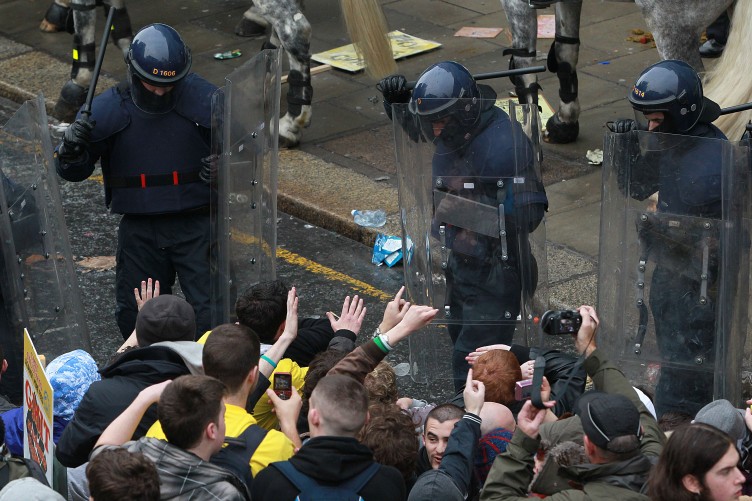
On the picture, the 2010 student protests are shown, at which participants were brutally beaten by the Gardaí.
Austerity post-2008 was when bankers got away with gambling away people’s lives and the universities were essentially privatised. In Ireland, banks got a €64 billion bailout, funded by taxpayer money.
Today, only 5% of students are from a disadvantaged background in Trinity College Dublin as per the HEA report of 2020. Socioeconomic diversity is at an all time low accross all Universities, as students must pay up to 14,000 € per year for tuition and overpriced student accommodation.
At the same time, student nurses midwifes and dental practicioners are being exploited. “Before their final year internship, most student nurses and midwives get either nothing or an allowance of just €50.79 per week,” says INMO, their union.
Students are emigrating under this immense financial pressure. However, if we combine our forces, we can still change our situation.
In the UK, grassroots groups organized in 2020-2021, engaging in rent strikes and eventually winning refunds of up to 30% for the academic year.
In the Netherlands, tuition fees were halved following the 2020-2021 academic year for 2021-2022, due to the loss of student experience during Covid-19.
All this shows that another system is possible. We need to organize ourselves in radical, mass organizations and keep pushing for change at every corner.
Here are the templates to email the Irish Universities Association (IUA) to ask them to reconsider in-person exams for Semester 1 and to instead opt for open-book, flexible time constraint and keyboard-mediate exams. Students, professors, everyone is encouraged to join!




Yesterday’s press release has been sent to all Heads of Schools and all Directors of Learning at Trinity.
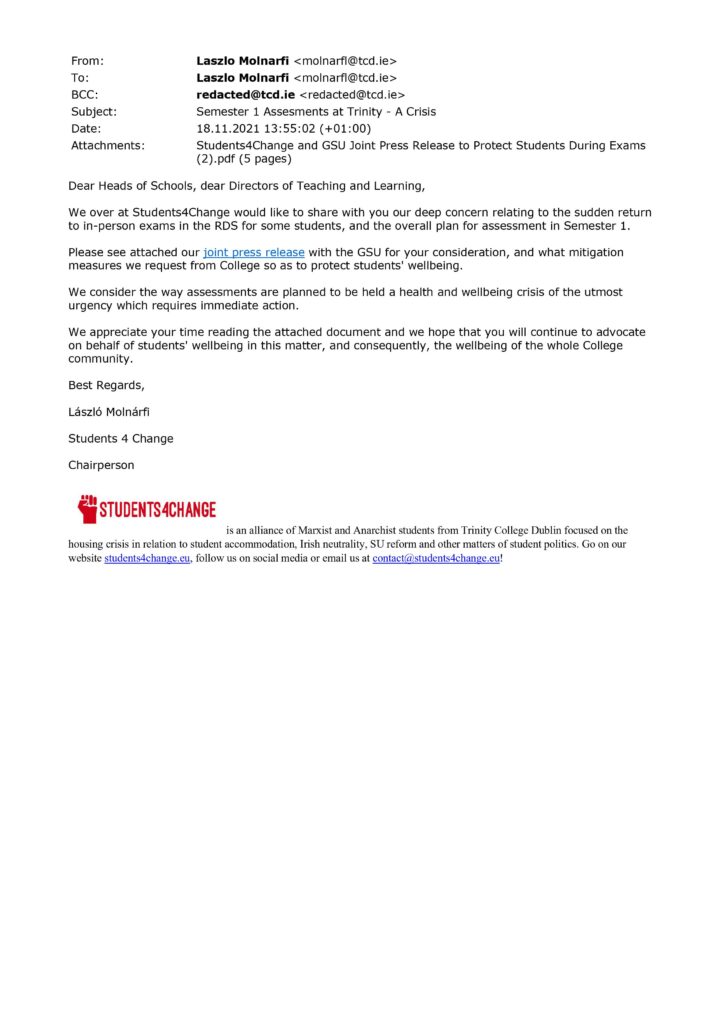

Dear undergraduates, dear postgraduates, dear students,
As we approach exams, Students4Change (S4C) and the Graduate Students’ Union (GSU) would like to share their utmost concern relating to the sudden return to in-person exams in the RDS for some students, and the overall plan for assessment in Semester 1.
Our position has been consistent since September. We have always advocated for a proper return to in-person classes, with strong hybrid learning supports in place for those who, due to Covid-19 or otherwise, are anxious about returning to College campus. In addition, we’ve taken onboard students’ worries about a sudden return to in-person exams in the RDS and advocated for holistic, open-book alternatives to traditional exams, which worked so well last year. Finally, central to our requests was that if the student experience is compromised, refunds should be given.
Chairperson of Students4Change László Molnárfi says, “there is an opportunity to build back better as a community, but College is squandering it with its short-term thinking and preoccupation with revenues. Instead of investing in re-timetabling software, proper ventilation and hybrid learning systems, they are trying to save face by refusing to acknowledge the deep-rooted governance problem that originates from the Provosts’ Office. There is a lack of democracy, transparency and accountability.”
This means that instead of progressing as an academic community, initiative is stifled by bureaucratic means, and decisions which are detrimental to students and staff are pushed through, with little to no consideration of their effects.
Students4Change and the GSU are calling on the IUA (Irish Universities Association) to reconsider the decision for Universities to hold in-person exams in light of current high COVID-19 numbers.“
We would like to express through this press release our concerns about College’s current lack of mitigation measures and contingency plans for in-person RDS and online exams in Semester 1 of 2021-2022. Last year, the counselling services at peak time – build-up to exams – averaged ‘100 on the waitlist and several weeks to see a 1-1 counsellor’. It is with this figure in mind that the exam season should be considered, as if it is done in an unthoughtful way, it will have catastrophic consequences for students’ wellbeing.
In general, our requests have been the following, which Students4Change has communicated to the Provosts’ Office via an email on the 30th of September 2021, and which the GSU has raised at College committees:
- We asked for College to consider the possibility of using the same exam format as last year, both for standard assessment in Semester 1 and for Schols, since open-book exams are a holistic way of assessment and should be encouraged all-around.
- We asked College to make sure that, in all cases, assessments are the least stressful possible. For example, put a permanent end to the use of the invasive Proctorio monitoring software, which can encourage unconscious bias, does not work for students from lower socioeconomic backgrounds and has serious data privacy issues.
However, with the upcoming in-person RDS exams and online exams, our requests need to be more specific, in the form of proposals. As such, we would like to ask for mitigation measures, and a contingency plan, which should include the following, and keep in mind the following:
- According to the TCDSU’s Mid Semester Review of 2020-2021, 28.9% of surveyed AHSS and HS students said that their primary working environment is not a private bedroom or study space. As such, we would like to ask that real-time online exams be extended to give flexibility to people with home environments that are not suitable for writing exams within a very short timeframe.
- As per statistics, 11% of homes in the North of Ireland (Ofcom Connect Nations Report 2019) and 20% of homes in the Republic of Ireland (Eir.ie National Broadband Plan website) do not have access to high quality broadband and so could be severely impacted by real-time online exams which have a strict time limit. This is another argument for extending these exams to be 24hr/48hr/72hr exams, like last year.
- Wherever possible, compensate for the language barrier. Currently, there is a serious language barrier issue relating to in-person exams. Imagine, for example, a second-year international student who has never written a handwritten exam and always wrote open-book exams on the computer, with the dictionary and spell checker. If English is not their first language, they will be very disadvantaged. As such, dictionaries provided by the College should be allowed (at least for those who need it as a special accommodation due to language difficulties), but also, in the ideal scenario, exams in the RDS should be written on the computer to ensure a level playing field, with accessibility accommodations.
- While our College has entry requirements for language, language tests like CAE and our College’s perception of what is considered adequate is terribly mismatched with what lecturers expect. A C1 (180+) on Cambridge Advanced English (CAE) is much easier to accomplish than to write a good exam in second-year.
- Computers for exams could be brought by students, and funded by College and the laptop loan scheme or by utilizing the computer labs.
- Keyboard-mediated exams are more flexible, can be corrected better and produce overall better quality for students and correctors.
- Extra time (15-20 minutes) could be given to students on request from the tutor, and allowances could be made for graders to not take into consideration grammar and spelling as much.
- The ideal solution is, of course, to simply move exams to be open-book assessments, with giving students ample time to submit by having long deadlines, based on last year’ model.
- Students from the countryside are disadvantaged, as they will have to travel up from their homes in crowded public transport, and spend hours in cramped exam halls. There is a serious Covid-19 danger, and College should as a whole reconsider in-person RDS exams, or at least, fund buses from cities to take students up to their exams. Just like how the government guidelines are being revised at the moment, College should also take a step back and consider the possibility of building back better with holistic assessment and hybrid learning technology for the long-term.
- In an email sent to all undergraduate and postgraduate students, College talks about how important personal responsibility is during Covid-19 and how “it would be a pity to miss assessments and defer to the summer”. In reality, College has allowed 78,000 tourists to visit campus between May and October of 2021, and should reconsider in-person RDS exams. There is a serious danger that students could get Covid-19, and long-Covid before and during exams, and as such students should be able to choose to repeat in April.
- Allow students to resit modules even if they have passed them, or to retrospectively defer assessments if they feel their performance has been affected.
- Try to offer possibilities for students to take their exams in smaller venues wherever possible to reduce the risk of catching Covid-19.
- Places to pray for religious students should be established within exam centers.
- Students should not have exams during their study period, even during contingency dates, especially since there are already loads of assignments due that week.
- The GSU President Giséle Scanlon is deeply concerned that the postgraduate community will have to sit in-person exams in a few weeks time.
“I have engaged with classes and there are many practical issues which surround in-person exams which we are deeply concerned about at the Graduate Students’ Union. As a quality and equality issue, handwritten scripts are much poorer in general and disadvantage certain members of our community (students can’t return to write a sentence without messing up a handwritten exam for example) and therefore we are calling for keyboard mediated exams with the assurance that there will be enough postgraduate research students as invigilators set up to take the anxiety out of exams this year.”
- In consultation with research postgraduates who have to teach and mark exam scripts – the GSU President Giséle Scanlon feels that:
“Having typed text to mark is the number one thing that will help the postgraduate community as it will improve quality for both students and teaching staff. A student can have an essay/answer and may wish to return to make improvements after handwriting pages, but handwritten scripts are too rigid and make improvement by addition and correction impossible and messy. Typed text creates a higher quality piece of work overall which is nicer to produce for our postgraduate taught students and less problematic to mark for our postgraduate research students.”
- If at all possible we would like to ask for College premises to be made available for students who will be taking off-books exams as cramped living conditions will prevent students from concentrating.
- The GSU has learnt from its doctoral cohort that “the one thing which is very stressful for students and teaching staff is last minute changes. An academic was teaching last week and ten minutes into a lecture was told that it also needed to be done on Blackboard because half a class had COVID or was awaiting results and if our T.A.s are preparing lectures/tutorials for in-person teaching there are animations behind the teacher on the screen and it helps to point things out. On Blackboard the animations don’t work, you can’t stand in front of the screen and those students who are learning from home just see a pixelated funny blob moving around. The teacher has to stand in front of the camera, so this is in a very controlled teaching environment so in terms of exams, I anticipate challenges with the rising number of cases. I’m worried that now we are lambs to the slaughter in an in-person exam scenario which will affect grades.”
- Also according to the GSU, there’s a second layer of complexity which is going to feature as a big problem if Trinity College goes ahead with in-person exams at the RDS. What do we do with students who are feeling unwell? A student being facilitated online whilst the rest of the class is sitting the exam in person… that’s an obvious inequity. The student who has to travel to the physical exam is disadvantaged having to use public transport and then to sit in a hall full of students which would mean possible exposure to the virus at a time when there are but a few weeks to Christmas and students will be travelling home.
The GSU President explained that “I tried to get an ambulance for a student last week onto the Trinity College campus and I was told there was a six hour wait by the ambulance services. Although there are nurses present in the RDS, what if a student needs an ambulance with the HSE being so stretched at the moment it’s a valid concern? I had to book a taxi to take the student to St. James’s Hospital. What if a student runs into difficulty in the RDS? I have worked at the RDS helping the postgraduate community during their exams, there are many variables and unknowns which we deal with as a Union and it’s a valid concern.”
- The GSU president is “calling on the IUA (Irish Universities Association) to discuss a deferral of in-person exams for postgraduates in light of the current national COVID numbers. We are concerned for students who are sick or might have COVID, or will be awaiting test results that through no fault of their own they will have to choose an alternative option other than in person. There’s an equality issue if some students sit exams in different circumstances and we need to negotiate a good option for all of our students. Whether that is to repeat or defer free of charge to February, we’re asking for a solution so that postgraduates don’t feel that they have lost something, like so many students last year.”
These mitigation measures are necessary to ensure the wellbeing of students and staff alike.
László Molnárfi, Chairperson, Students4Change +32 470583174
Gisèle Scanlon, President, Graduate Students’ Union +353864120444
Abhisweta Bhattacharjee, Vice-president, Graduate Students’ Union +918583981336
Students4Change has undertaken a research on inclusivity at Trinity College Dublin and has found that there is a rigid, inflexible system which is a barrier to accessing education for many, especially disadvantaged groups.
Students4Change has always advocated for choice for students regarding online or recorded lectures. Other universities already have hybrid learning, such as 293 Colleges in the U.S. which employ hybrid learning (Source: C2I).
During the pandemic, students with disabilities faced increased barriers with regards to their education. One of these barriers was not-recorded, online live events which posed challenges for students with, for example, hearing difficulties.
Despite the return to face to face lectures, some students may be hesitant or anxious to come back in a full time capacity, either due to general anxiety around the ongoing pandemic, or due to them having vulnerable family members that means that they cannot take the risk, however small, of catching Covid-19 when in college.
Recently, staff complained of a lack of CO2 monitors, which measure how well rooms are ventilated. College could have worked on ventilation during the summer, but they choose not to, possibly due to the expenses associated.
Students who commute from long distances to come to college often have to get up very early, and have worse sleep schedules than students who live closer to college. The mental toll reduced sleep has on a student’s performance could be minimised if hybrid learning was implemented, giving students the opportunity to commute later and watch the recorded lecture when they have time later on in the day, not to mention financial considerations.
“My first semester of College cost ~150€ in bus fares and my girlfriend has spent about 50€ last week on train fares, ” says a student.
With the unaffordability of accommodation and many students commuting, recorded lectures and hybrid learning opportunities offer a more equal playing field for all students to get a quality education with reduced barriers to entry, not to mention that since not all courses were recorded during the Covid-19 pandemic, some students had less access to education than others, and as such, it was not a level playing field. It needs to be ensured that this does not happen again.
This issue will also manifest itself if in-person exams return, with students having to travel for online and in-person exams, both which might be scheduled for the same day.
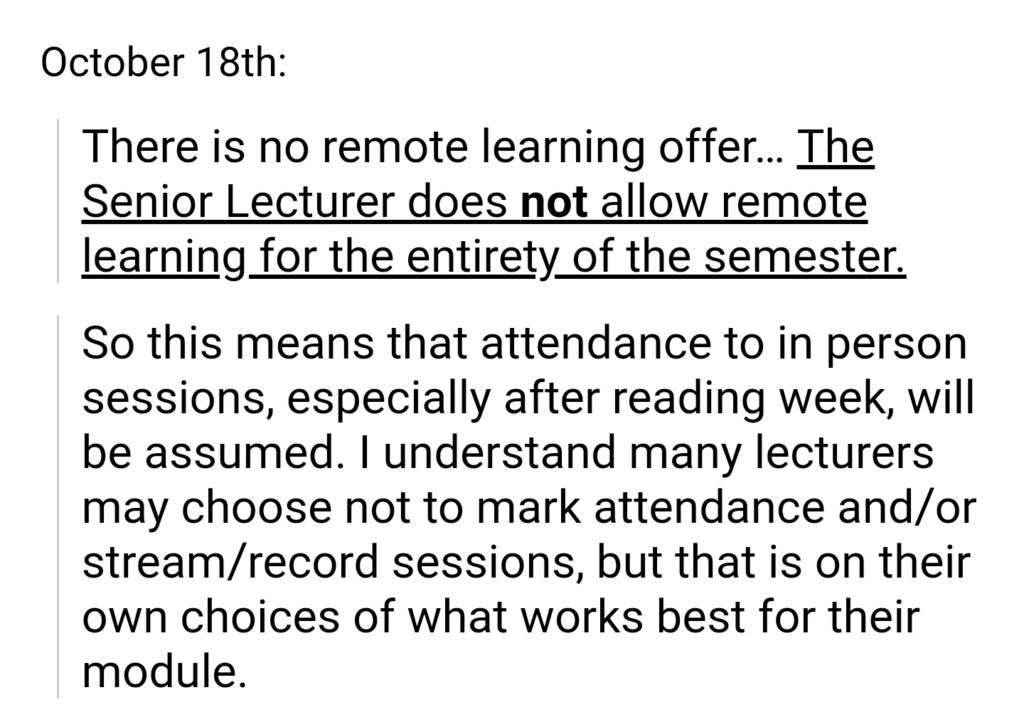
The issues surrounding lecture recording have been dealt with in our press release on September 12th, and it is our view that these issues are surmountable.
Student testimonies support a policy for hybrid learning. There is a moment, here and now, to push for this, and to build back better. Despite this, College’s re-opening plan is still chaotic and has barely an inclusivity considerations.
For example, a student shared with us that they were promised the ability to follow College online on September 6th, but College backtracked on this by the 18th of October, despite document proof that they are in HSE’s “high-risk” category. At the moment, their case is being helped by the Disability Service, but the outcome is expected to last weeks, at which point almost the whole term will have gone by.

In a similar vein, there are a variety of exclusivity-related issues in College, namely that the LENS system is not effective enough. In one case, there was a part of a computer science module to which a student had to travel to 2.5 hours every Thursday to present their work, despite “it taking about 5-10 mins per student”.
“I emailed the lecturer explaining that I have severe travel anxiety (supported by my LENS) and wondering if I could just email my code in each week, however he adamantly refused to offer this. I even met with the head of my school and the Disability Services and nothing could be done about this and I was forced to take that travel time each week,” they say.
LENS reports are very limited in scope of what they can mandate from lecturers, and that does not guarantee that a lecturer will immediately grant what entitled to when a student has a LENS. The LENS primarily revolves around smaller things like alternate exam venues (instead of the RDS), a small amount of extra time in exams and access to the respite spaces on campus (which are themselves incredibly limited in scope, allowing only short amounts of time in them and requiring booking in advance). Any form of accommodations beyond what is in a student’s LENS are entirely up to the lecturer, and it is on the student to request them, which can be a demeaning experience.

In some cases, the widthrawal of remote access seems absurd. For example, in the Computer Science department, remote lab access was withdrawn. They could reserve a few for remote access, but either there are a lack of computers or this consideration was not taken into account.
As such, a pattern was found to emerge. Casework by the Unions help, but the system by large remains insufficient because of bureucracy. As one student put it, “support services [during Covid-19] did not apply to people who are genuinely seeking help. They are a bandaid to a larger problem, that you have to beg for the process knowing it won’t ease the pain”. “Case-by-case” basis can produce results for some, and is better than nothing, but it also means that there is no effective long-term policy for dealing with an issue.
Specific issues that have been raised with us in our research:
- The changeover of TCD-supported disability aid software from Grammarly to Microsoft Editor was done without consideration or consultation to users.
- LENS report applied marking scheme not being used for grading assignments. E.g. no penalties for spelling and grammar would fall under this citerion.
- Lecturers need to be aware that for some students, there is a marked difference in how they absorb information, which is different for online and in-person education, e.g. for discussion-based learning.
- Emails go ignored, which is an issue for cases which have deadlines. For example, for one module’s assesment, voice narration was required, “I was struggling with a lot of anxiety when talking to other people, [so] I reached out to my lecturers for the module asking if I could write my part for the update, and my emails were completely ignored”, they say.
- For assesments, more leeway should be given. Considerations that should be given include for those with slower reading and writing times for essays (e.g. dyslexia), those with chronic migraines, etc. During Covid-19 in the University of Manchester (which has a radical student movement), mitigation measures included automatic assignment extensions up to 7 days for two pieces of coursework, and the removal of the need to provide medical evidence for mitigating circumstances applications. “I have a good friend who is gonna be given a zero on an assignment despite having an IV in her arm right now because she “doesn’t have a doctor’s note, ” says a student.
- The perception on-the-ground is that there is little to none continued support for hybrid learning. The technology is already partly there in College, so this seems like an absurd decision.
We would like to note that the workload of academic staff, which with ever-increasing administrative and bureaucratic aspects, is also a barrier to access to education for students. It results in academic staff not having as much time as they should to consider individual students on a case-by-case basis.

Similarly, but on another matter, LLM Law students had their graduation on Diwali this year (2020-2021), and despite complaints by Indian students, it was not changed. This means that Indian parents, for example, could not always come and see the graduation of their sons and daughters. Another student missed the graduation sign-up deadline, and despite pleading with the College, was not allowed to attend the ceremony, despite his girlfriend having travelled 4,500 kms to Ireland. These are all signs of a creeping takeover of College by bureaucracy which appears rational, but in reality, is the not conducive to human existence.
Graduation, in any case, should be based on alphabetical order (for being called up on stage), and should have a more inclusive dress code. Dress codes are generally ableist as they do not allow for flexibility in the event of discomfort formal clothes bring to disabled people, such as those with sensory processing issues related to autism where an autistic individual may be averse to the feeling of certain materials. We should also acknowledge non-binary people. Here is a list of policy suggestions that S4C made with the TCDSU’s Welfare Officer.
Schools need more funding, and College needs more democratic and inclusive decision-making structures, and long-term sustainable planning needs to replace chaotic short-termism. The bureaucracy needs to be done away with, and replaced with human-centric structures.
Thank you to everyone who contributed.
László Molnárfi
According to documents from College Board’s meeting on the 19th of May 2021, two possible locations to temporarily house the Book of Kells interim exhibition were presented and approved as part of the Old Library Redevelopment Project (OLRP). The tentative locations agreed at Board were Library Square and New Square.
However, between June and August of 2021, the Bursar, Chief Operating Officer of the Corporate Service Division and Estates & Facilities of Trinity College Dublin engaged with Dublin City Council (DCC), who allegedly deemed these two locations unsuitable, and proposed the location of College Park instead. To date, no paperwork or correspondence surrounding this decision has been made available for scrutiny.
The idea of College Park as a location, as yet comes with no formal application and extent of the engagement is unclear, but College was ‘guided that planning permission would be unlikely for either location [the Library Square and New Square’. It seems to have been more like a conversation than a formal engagement process with no concrete evidence as to why the originally proposed two locations were unsuitable.
“I have asked the Bursars’ Office for clear data surrounding the decision-making process between College and DCC, but to date I have not received a response,” says TCDGSU President Ms. Giséle Scanlon. Trinity Fox, in light of this lack of engagement between College and the TCDGSU, has submitted a Freedom of Information (FOI) request to find out information about how College and the DCC arrived at this suggested new location.
Stakeholders directly impacted by this decision had heard nothing of this change in location for four months until the Estates Policy Committee (EPC) on the 15th of October 2021, at which Ms. Scanlon was the sole dissenter of the proposal, and raised deep concerns about the impact this structure would have on-campus sports, mental health and the well-being of everyone, including those working in the buildings adjacent. The EPC is “a Principal Committee of the Board responsible for the review of policy in the area of the development and operation of the College’s sites” and “the meeting was led to believe that extensive engagement had taken place between the Bursars’ Office and stakeholders, who would be deeply impacted,” she says, “I believe committee members were misled, as there had not been adequate engagement with stakeholders. Our own engagement with the GSU, similar to the, consisted of a brief meeting with the Provost”.
Because EPC does not have a representative from on-campus sports clubs or the TCDSU, Ms. Scanlon bore the sole responsibility of representing the student voice, and dissented, because she felt there had not been enough consultation with her members and other clubs across campus.
“It became clear to me that the official slides presented at the EPC did not have the correct pitch sizes. When I left the meeting, as a matter of transparency, I Tweeted my concern and mentioned that I had dissented. Within an hour, DUAFC (football club) expressed surprise that this location was even an option, as the proposed measurements do not cater to football appropriately. I was deeply concerned that neither DUHAC (athletics club) nor DUAFC and the DUCC (cricket club) had not been consulted before the meeting on the 15th. I talked to postgraduates who are members of these clubs and they confirmed that not only had no one spoken to them, but the captains of these clubs had not heard a single thing about College Park as a proposed venue”, she says.
Essentially, Ms. Scanlon’s Tweet about her dissent is the way the wider student body discovered the new proposed location.
Ms. Scanlon isn’t the only one to have voiced feelings of discontent with the new location and the lack of stakeholder engagement. It is reported that trade unions oppose the structure’s location as well, due to it taking away natural light from those working and studying in the neary buildings and libraries.
Mr. Raymond O’Malley, President of DUAFC (football club), said in a written statement to Trinity Fox that “The prospect of not having home matches at College Park for up to 4 years is unthinkable for the Club,” adding that “in our opinion, Library Square or New Square would be superior locations and the temporary nature of the proposed structure would ensure no permanent impact on the setting of either square or the adjoining buildings, which are protected structures. Dublin City Council has recently granted a temporary permission for Covid related structures in New Square that were permitted to remain in place for up to 3 years or whenever the covid restrictions ceased, whichever is sooner. In other words, the Council has accepted the principle of a temporary structure at these alternative locations, so their apparent resistance now to this proposal at those locations is inconsistent”.
Ms. Laura Brennon, President of DUHAC (the athletics club), said in a written statement to Trinity Fox that while they recognize the importance of the redevelopment project, they “are deeply concerned about the impact the proposal of a temporary structure on College Park would have on student sport and recreation. As a club, this is our main training ground, and we simply cannot afford to lose this facility. We pride ourselves in being an easy and accessible club where recreational runners can train alongside world class athletes and College Park is at the heart of this,” and pushed for alternative locations to be found for the Interim Exhibition.
Dr. Ian Morrison, coach at the athletics club, added that “College Park is the heart and soul of our club in DUHAC. [..] [It] is where National Champions and beginners can be observed in training, coaching and developing and our only guaranteed time on grass for most of the athletes. We carefully use the entire perimeter respecting the inside soccer pitch and cricket crease. This will be destroyed by annexing a portion of College Park. Our running area will be massively reduced, to the point that no long intervals could be done without risking injury. We would have to run over cricket and soccer areas recurrently damaging the inside surface and we could not share College park on training nights as we currently do. [..] In the 1990s DUCAC and Trevor West the then Chair fought to stop development on College Park when the College proposed it be sacrificed. This “temporary” structure for 3 years will destroy the grass permanently and College’s record of temporary structures is sadly poor”.
On the 16th of October 2021, DUCAC (representative body for all sports clubs), who have so far shown no willingness to come out against the plan, sent an email to affected sport club captains inviting them to a meeting with DUCAC Chair Mr. Matthew Simons (who ran on a campaign of listening to sports clubs) and Head of Sports and Recreation Ms. Michelle Tanner. The email writes “We will also be providing you with some lunch so please come hungry, ” and essentially issued a gag order on sports clubs, saying that there is a “second meeting [with the Provost]”, until which “we would appreciate [..] that you do not comment to the Press (University Times, Trinity News) about any questions that may be directed to you”.
The EPC feeds into the College Board, at which the final decision is expected to be taken on the 3rd of November 2021 on the location of the Interim Exhibition. A widely-shared petition was launched by Ms. Scanlon in opposition with already over 1,600 signatures at the time of writing, and was backed by independent activist group Students4Change. DUFAC has also come out in support of the petition, with DUHAC and DUCC also voicing their opposition.
Mr. O’Malley also commented on the petition, saying that “College Park needs to be protected for all Clubs and Students and not hijacked for tourists”.
Ms. Aisling Ahern, alumni of the College and former Ladies Harriers Captain wrote that she is “saddened and disappointed that the College would consider the wonderful facility of College Park dispensable. It is absolutely essential as the heart and soul of DUHAC and had contributed endlessly to the fitness, health and happiness of members in Trinity Athletic’s 150 years of existence. […] Knocking the park out of use for 3 years is unacceptable and would damage the long standing culture and tradition of Trinity College Athletics”.
Another student who signed the petition lamented that “greedy developers are even here [in] one of the oldest schools”, echoing sentiments across College that corporatization is slowly destroying third-level educational institutions.
Documents relating to the Exhibition Pavilion also show a proposal to transform New Square into a ‘wellbeing space’ for students and staff, which is understood by some as an attempt to placate student representatives, some of whom, like DUCAC and TCDSU, have so far shown no willingness to oppose the proposed location despite their constituency’s democratic will. It also mentions that the School of Engineering, Provost Linda Doyle’s research area, are interested in using the space, under the heading ‘longer term potential benefits’, which details its possible uses for longer than 3 years.
Neither the College Bursar, the Head of Sports and Recreation, TCDSU nor the DUCAC Chair was available for comment as of the publication of this article. Trinity’s Director of Public Affairs and Communications, Mr. Tom Molloy declined to comment on whether there was engagement from College with the Old Library Redevelopment Steering Committee, a working group of the Library, with regards to the new location of College Park.
In a written statement to the University Times, Trinity Media Relations Ms. Officer Catherine O’Mahony said that “College has made commitments to ensure proper engagements are made throughout the project for impacted clubs and individuals. College is looking to work with the community to ensure the Old Library project proceeds with the support of all stakeholders and for us to minimise the impact of the location for the interim exhibition on sport and recreational activities”.
© 2025 Students4Change
Theme by Anders Noren — Up ↑

